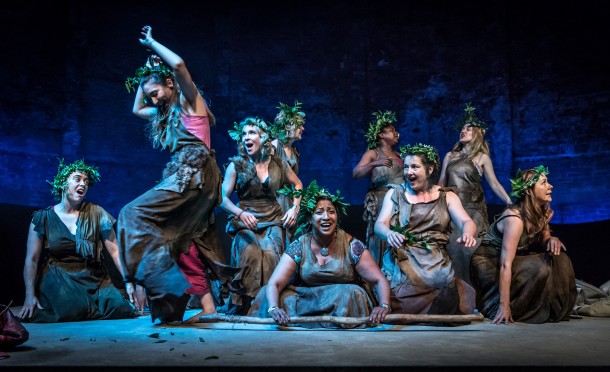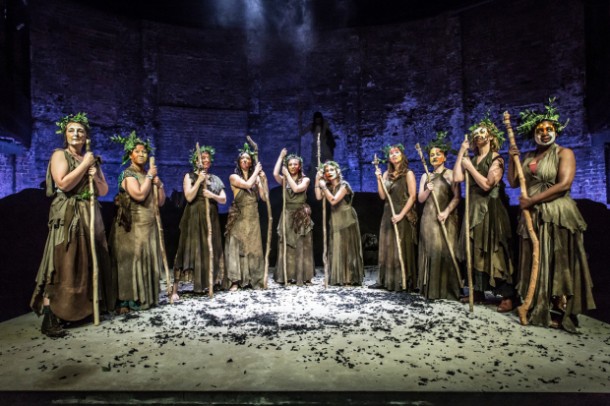The Almeida Theatre in London’s Islington has been running a season of Greek plays beginning with a rather mix-and-match Oresteia that later transferred to the West End. This was followed by Euripides’s Bakkhai, spelled thus by translator Anne Carson to signal its Greek rather than its more familiar Latinized form, and so to underline the strangeness of the play. There was a splendid all-female Chorus (characteristic of Euripides though played by boys, ephebes, in his time), in which singing (or chanting) and dancing alternated with their share of the rhythmical dialogue; and the play was performed with just the three male actors then permitted (an addition by Sophocles to the two who performed in Aeschylus).
Yet no setting could be more different from the open-air theatre of Dionysus in Athens: this small, intimate space has untreated brick walls, and the relationship between audience and action is intense. There were no masks to sever the link with the actors: we knew the performers could see us. Dionysos even invited us to dance with him (no one did) and at one point the Bakkhai sat on the edge of the stage as if they would jump down into the audience. Disguise, role-playing, ecstatic dancing, demonstrated in various ways that identity, above all perhaps gender identity, is not fixed, but can be transformed or challenged. Almost everything about the production contributed to that message, which became both more liberating and more threatening as the play went on. Dionysus (Bakkhos) was the god of theatre, and so also of personal transformation. The elderly Kadmos and Tieresias dress as women to join the festivities, and eventually Pentheus is induced to do so too in the famous “toilet” scene: “how do I look?” These are necessary ingredients of the play, yet in this production were made constantly and disconcertingly to cross the edge between humor and horror. The resulting anxiety, both generic and sexual, was perhaps the most obvious way in which the audience was made to feel the power of Dionysus, so close we could almost touch it.
“Here am I,” said Ben Whishaw, making his entrance as Dionysus in jeans, long white tee-shirt with flowing dark hair to below the waist and a high erotic charge, smiling toward the audience but even now insinuating the barely concealed threat that is to be horrifyingly realized as the tragedy progresses. He has come, he explained, to impose his new religion and “to thrill you. Thebes. Don’t doubt I will. Here’s what you need: a fawnskin, a thyrsus, absolute submission.” Thebes is the first Greek city he has visited, having already “set all Asia dancing,” but it appears that, even though his mother Semele was local, the new king Pentheus, son of Semele’s sister Agave, does not acknowledge this new god. “But I am a god. I’ll show him. Him and all his Thebans.” Petulant? Yes, and dangerous. Canadian poet and classicist Anna Carson’s translation, as these quotations show, is racy but not offensively so, and its diction is clear and well adapted for performance.

Bakkhai at the Almeida Theatre, London. Photo credit: Marc Brenner.
Whishaw was the star of the show, depicted on the poster in a pensive but threatening mood: he returned in various shapes including finally that of the triumphant bull-god. In keeping with the theme of transforming identities, he also played both Teiresias, ancient prophet of all the Theban tragedies, who speaks up for this new god, as well as the messenger who must tell the terrible story of the drug-crazed madness of the maenads out on Mt. Kithaeron. Kevin Harvey played the aged Kadmos, already in the grip of the Bakkhic frenzy, and doubled as a guard and an appalled servant. Yet the most extraordinary acting and most shocking gender reversal was that of Bertie Carvel. He entered as King Pentheus in an elegant business suit, contrasting in a key early scene with the robed and long-haired Dionysus. Then in the emotionally overwhelming coup of the play Carvel returned as his own mother Agave, bringing in the head of her son on a long staff (the thyrsus of the Bakkhic ritual)—a head which, for a long time she continued to insist was that of a lion she had courageously slaughtered in the ritual sparagmos (when a wild animal is torn apart and fed to the participants). “But the trophy in her hands is her own tears.”
Limiting the principals to three actors required such changes of roles, but in this production, shifting between male and female brilliantly exploited a vein of homoeroticism between Dionysos and Pentheus, as the playful and effeminate god activated the suppressed fantasies of the straight and uptight ruler and eventually persuaded him to don women’s clothing so that he could spy on the doings of the mob of female followers out on the mountainside. Whishaw’s Dionysos constantly luxuriated in his erotic charisma; his elegant body movements had powerful androgynous appeal, too much for poor Pentheus.
The Chorus is always one of the main challenges for a director of Greek tragedy, but in this play their role is intricately involved in the action. In the closed and darkened space of the Almeida, their presence was electrifying. Ten ethnically diverse followers of Dionysus, they entered separately and rummaged around in their bags to bring out old clothes to put on with their roles. Gradually, as the sense of Bakkhic community absorbed their individuality, they were wrapped in fawn skins, with wild ivy tangled in their hair and paint smeared on their faces. As the action intensified, so did their singing and dancing. We watched “those poor passionate women” (as Carson calls them in a poem attached to her translation) on all fours, faces daubed as animals, banging staves (the thyrsus) on the wooden stage, and chanting increasingly murderous lines: “We dance for Bakkhos,/ we dance for death!/ Pentheus’/ death—/ born of a snake, dressed as a woman,/ he took up a thyrsos and followed a bull directly down to Hades./ For the thyrsos is certain death!” Orlando Gough’s brilliant and eclectic score for such irregular lines evoked both African drumming (lots of thyrsus banging), and Balkan folk-music, perhaps what Euripides would have heard as he composed the play in his Macedonian exile.

The Chorus in Bakkhai at the Almeida Theatre, London. Photo credit: Marc Brenner.
The design and dress of the performance inevitably recalled the confrontations of the 1960s (like the ones in Berkeley where I was a student). On the one side were the government and university authorities who called out the police in their Blue Meanie uniforms, guns and night-sticks: on the other the students and hippies, discoverers and consumers of mind-bending drugs and liberated followers of new, uninhibited life-styles (Dionysus was also known as “the liberator”), politically opposed to what the regime stood for, at that time the Vietnam war. Those heady days have long gone, but this production echoed those conflicts and also the values of each side: the city with its male-dominated political order versus the wild countryside where fluctuating sexuality, inebriation and, well… a certain kind of femininity, prevail. All this inevitably alluded to Richard Schechner’s influential sixties-based Dionysus in 69 (and Brian de Palma’s film), although the production was blessedly free of Schechner’s audience interaction (the famous “group grope”): this was superb theatre, not a “happening.” Even in a 1960s-like context, however, one of the most powerful lines of the play is that of the aged Kadmos, in the face of the carnage wrought by this new divinity: “Gods should not resemble humans in their anger.” Does the line by itself have the power to tilt the balance of the play against the immensely potent but destructive god and in favour of the various forms of ordinary humanity on display? Perhaps not. But Greek tragedy has rarely seemed so pertinent or so powerful.
has degrees from Cambridge, the University of North Carolina at Chapel Hill, and the University of California at Berkeley. He is the author of a history of the devil, entitled The Old Enemy: Satan and the Combat Myth, a book about Paradise Lost entitled The Satanic Epic, both published by Princeton, and a biography of Milton (Oxford: Lion). His numerous articles in learned journals concern a range of topics from Gilgamesh to Dickens and Larkin. One of his essays on Shakespeare films has now reappeared in a new edition of Macbeth. He has taught at San Francisco State University, UC Berkeley, Bryn Mawr College, the University of Geneva, and is now Professeur Honoraire at the University of Lausanne in Switzerland.
European Stages, vol. 6, no. 1 (Spring 2016)
Editorial Board:
Marvin Carlson, Senior Editor, Founder
Krystyna Illakowicz, Co-Editor
Dominika Laster, Co-Editor
Kalina Stefanova, Co-Editor
Editorial Staff:
Elyse Singer, Managing Editor
Clio Unger, Editorial Assistant
Advisory Board:
Joshua Abrams
Christopher Balme
Maria Delgado
Allen Kuharsky
Bryce Lease
Jennifer Parker-Starbuck
Magda Romańska
Laurence Senelick
Daniele Vianello
Phyllis Zatlin
Table of Contents:
- Hamlet in a Curious Nutshell by Maria Helena Serôdio
- Alvis Hermanis Productions in Latvia and German-Speaking Countries by Edīte Tisheizere
- The Unknown, the Unexpected, and the Uncanny: A New Lorca, Three New Catalan Productions, and a Few Extras by Maria M. Delgado
- 2015 Dance Week Festival and Contemporary Croatian Dance by Mirna Zagar
- Archives, Classics, and Auras: The 2016 Oslo International Festival by Andrew Friedman
- The Stakes for City Theatres: Linus Tunström’s Farewell to the Uppsala Stadsteater by Bryce Lease
- Life is Beautiful? or Optimistically About Bulgarian Theatre? by Kalina Stefanova
- The Multiple Dimensions of the Bulgarian ACT Independent Theatre Festival 2015 by Angelina Georieva
- Theatre in Berlin, Winter 2015 by Steve Earnest
- Musical Theatre in Berlin, Winter 2015 by Steve Earnest
- Gob Squad’s My Square Lady at the Komische Oper by Clio Unger
- New Productions in Berlin by Yvonne Shafer
- Manifest for Dialogue: Antisocial by Ion M. Tomuș
- A Fall in France by Heather Jeanne Denyer
- The Iliad as an Oratory: A Warning to a Civilization by Ivan Medenica
- Escaped Alone by Caryl Churchill at the Royal Court Theatre by Rosemary Malague
- Bakkhai at the Almeida Theatre reviewed by Neil Forsyth
Martin E. Segal Theatre Center:
Frank Hentschker, Executive Director
Marvin Carlson, Director of Publications
Rebecca Sheahan, Managing Director
©2016 by Martin E. Segal Theatre Center
The Graduate Center CUNY Graduate Center
365 Fifth Avenue
New York NY 10016



